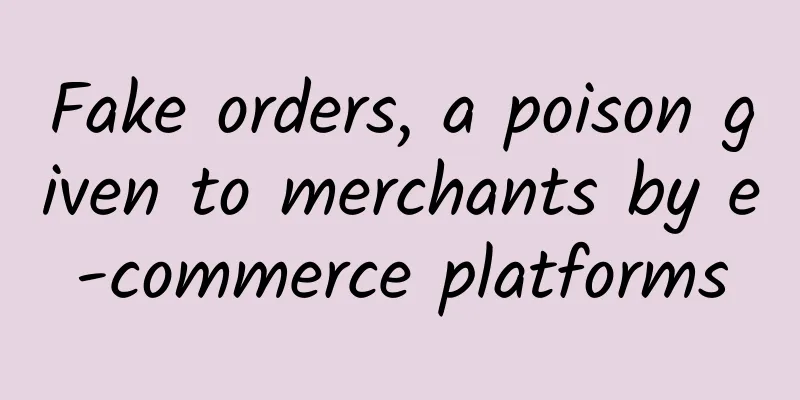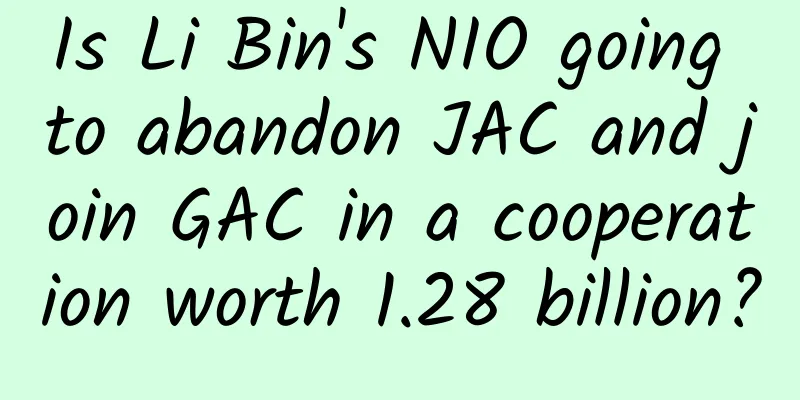Fake orders, a poison given to merchants by e-commerce platforms

|
Recently, the media exposed an incident in which netizens reported that JD.com employees arranged merchants to place fake orders to increase JD.com's sales. On the afternoon of April 3, JD.com announced the results of its internal investigation. The employee involved had seriously violated the company's regulations when communicating with the merchant, and was immediately dismissed in accordance with relevant regulations. The relevant person in charge was also punished internally by the company for his employee management responsibilities. Don't laugh at me if I take fifty steps but a hundred steps After seeing this news, Lao Bing really felt sorry for this guy. He was forced to fake orders due to performance pressure. If you want the merchant to fake orders, you can just express it implicitly. It actually appeared nakedly in the chat records with the merchant. Such low emotional intelligence deserves to be fired. Based on Lao Bing's many years of experience in dealing with these e-commerce platforms, the correct approach should be various coercion, inducement and hints. If you don't complete the sales task, don't expect to have good resources and traffic. Merchants are not fools. People who don't know how to do it are embarrassed to say that they are in e-commerce. Why bother to talk so nakedly in black and white? JD.com is really worried about the increasingly serious fake order problem. So much so that a vice president of JD.com said in an interview with the media that we should be wary of the possible driving force behind these incidents, and that the soil of JD.com is different from that of Alibaba. Seeing this report, I really feel like I am the pot calling the kettle black. The fake order problem on Alibaba's platform is well known to everyone, and it will take a long time to cure it. Recalling that Tmall was bitten by the State Administration for Industry and Commerce for fake goods at the beginning of the year, JD.com was complacent, and Liu Qiangdong also made sarcastic remarks in public many times. Now JD.com has also been exposed for fake orders. It has to be said that it is a slap in the face of Liu Qiangdong. Fake orders are a poison given by the platform In dealing with fakes and false orders, in order to maintain the most basic trust in the platform among consumers, Lao Bing absolutely believes that both Jack Ma and Liu Qiangdong, as a vice president of JD.com said, do not tolerate any grain of sand in their eyes. They have zero tolerance for fakes and false orders. If any employee has a problem, they will be "fired without exception", and in fact they do so. If they cannot tolerate any grain of sand, why is there so much of it? Let's start with the analysis from the macro level of the whole society. Whether it is the problem of counterfeit goods or the problem of fake orders, it is related to the whole social business integrity system. There are no fewer fake goods offline than online, but because they are more dispersed and not concentrated offline, unlike the Internet where they are monopolized by a few large e-commerce platforms, they are often ignored. The same problem applies to fake orders. Aren't the people queuing up offline to attract attention typical fake orders? Who cares about them? E-commerce giants under the spotlight are destined to bear such doubts. Let's analyze it from the perspective of the e-commerce platform itself. Merchants will not get up early without profit. Merchants are willing to take such risks must be profitable. Existence is reasonable, and the emergence of fake orders itself illustrates the value of the platform. Platforms without fake orders are sad, not because they can't be faked, but because your traffic is too small and it is not worth it for merchants to fake orders at all. On the Alibaba platform, the cost of each fake order is at least 10 yuan. What does this mean? It means that if your product has a customer unit price of 100 yuan and a profit of 20%, this has accounted for more than half of the profit. The wool comes from the sheep, and it is the consumers who pay for the fake transactions in the end. For merchants, fake orders are a helpless solution. If you can get a ranking without fake orders or by placing advertisements, who would give up a lot of profits to fake orders? "Not brushing orders is waiting for death, brushing orders is seeking death", behind this is actually the helpless move of merchants. The so-called different soils of JD.com and Alibaba are just rhetoric. Whether it is Alibaba or JD.com, as commercial organizations, they all have the demand to pursue higher GMV (Gross Merchandise Volume) to obtain higher profits, which inevitably requires a mechanism to allocate traffic and resources according to sales. The higher the sales volume of merchants, the more resources and traffic they will obtain. This is very consistent with the competition mechanism of the commercial society, and this competition mechanism is of great benefit to the platform ecology. In order to obtain more resources and traffic, merchants will use their own resources to help the platform attract traffic and increase transaction volume. Let us imagine that if resources are not allocated according to sales volume, but are allocated equally or randomly, it will be unfair to merchants who want to grow bigger and stronger on the platform, and the platform will lose its competitive vitality and eventually decline. Finally, let's analyze it from a more micro perspective. Here we have to talk about the evaluation methods of the Xiaoer of the two platforms. As the saying goes, the butt determines the head. His evaluation is deeply linked to the completion of GMV. In order to complete the task, what can he do? We can all figure out the logic with our eyes closed. We can only exchange resources and traffic with merchants. The condition of the exchange is of course that you merchants must help me achieve more sales. Then how do sales come from? Are there other solutions besides brushing orders? Some people may say that I can spend advertising fees, but if you have enough advertising fees to spend, you naturally don't care about the so-called resources he gives, but the problem is that a considerable number of merchants are small and medium-sized sellers. Without enough advertising fees, they can only solve the problem by brushing orders in the end. All in all, fake orders are a glass of poison that the platform has given to merchants and they have to drink it. Will you drink it or not? As a winner of Toutiao's Qingyun Plan and Baijiahao's Bai+ Plan, the 2019 Baidu Digital Author of the Year, the Baijiahao's Most Popular Author in the Technology Field, the 2019 Sogou Technology and Culture Author, and the 2021 Baijiahao Quarterly Influential Creator, he has won many awards, including the 2013 Sohu Best Industry Media Person, the 2015 China New Media Entrepreneurship Competition Beijing Third Place, the 2015 Guangmang Experience Award, the 2015 China New Media Entrepreneurship Competition Finals Third Place, and the 2018 Baidu Dynamic Annual Powerful Celebrity. |
<<: Photography O2O is on the rise and the scope of gold mining is gradually expanding
>>: "Foreign Language Restriction Order" implemented, video websites turn to self-produced dramas
Recommend
What should I do if my boss suddenly asks me to work on a community group? 10 steps to build a community from 0 to 1!
1. Let me start with three points that I think ma...
Why is iron the most stable metal? Aren't gold and silver more stable than it?
The big explosion of the sun's death created ...
Zhang Jianman's 30 Relationship Management Lessons All Smart Women Need Watch Online
30 relationship management lessons, teach you not...
Studying abroad is to return to serve the country, he returned to China to do "what the country needs" | Time Letter
Science has no borders, but scientists have a mot...
Product operation from 0 to 1: How to obtain seed users?
This article mainly focuses on the practical part...
How to do social marketing for B2B products
Community marketing is when people with the same ...
The public version of ARM architecture is the king, and independent CPUs are useless?
For mobile phone processors, you don't need to...
In Shanghai, people are already eating cacti from flower pots
Editor's note: Calendar Girl recently receive...
Wang Chuanfu resigns from BYD and its 12 subsidiaries. Is there a power change in the company? You think too much!
On May 21, BYD Auto Co., Ltd.'s business info...
Brand Retail Private Domain Solutions
Precision marketing based on big data is really s...
Do dogs also have their periods? What should you do when they do?
A few days ago, a dog owner found that his dog ha...
Spinach is not a reliable source of iron, but these nutrients are pretty good!
Author: Xue Qingxin, registered dietitian Reviewe...
Carbon dioxide synthesizes protein. Will we be starving in the future if we don’t eat?
Tuchong Creative I believe everyone is familiar w...
What are competing products? 8 ways to collect competitive products
First of all, what is a competitor? Why do we nee...
6 ways to monetize your products!
The ultimate goal of a product is often to realiz...









